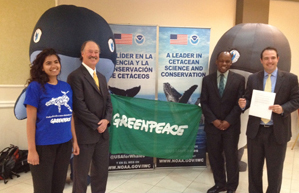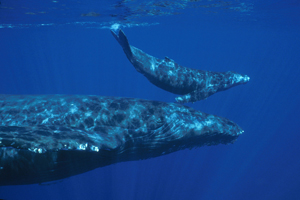
Greenpeace presented U.S. delegation at the IWC in Panama with letter and more almost 53,000 signatures thanking President Obama and his administration for supporting whale conservation and asking him to continue supporting the international moratorium on commercial whaling. From left to right, Meena Hussain with Greenpeace, U.S. delegation Doug DeMaster, Russell Smith and Ryan Wulff.
Download here. (Credit: NOAA)
This week the U.S. announced new whale conservation initiatives and led the effort to promote conservation work at the 64th yearly meeting of the International Whaling Commission (IWC).
The U.S. provided leadership at this meeting for discussions about disentanglement, strengthening the international moratorium on commercial whaling, ship strike avoidance and responsible whale watching. The IWC is the premiere international organization for the conservation and management of whales.
The U.S. delegation announced that they would continue working with Argentina and Brazil on capacity building and training in relation to disentanglement response. In addition, they hosted a premiere showing of the Emmy award-winning film, "In the Wake of Giants," about NOAA's effort to disentangle whales caught in fishing gear in the Hawaiian Islands Humpback Whale Sanctuary.
Also at this week's IWC meeting in Panama, Greenpeace provided the U.S. delegation with almost 53,000 signatures and a letter to President Obama thanking the Administration for their conservation efforts. In the letter, Greenpeace also asks the president to continue efforts to strengthen the international moratorium on commercial whaling.
"We are very proud of the effort of the U.S. in whale conservation," said Ryan Wulff, U.S. Alternate Commissioner for the IWC. "As members of the IWC, we want to lead the effort to advance our conservation agenda, and to share with other countries some of the techniques and strategies we are using in the U.S. to conserve whales."

A humpback whale and its calf in NOAA's Hawaiian Islands Humpback Whale National Marine Sanctuary.
Download here. (Credit: NOAA)
As a global leader in whale conservation, the U.S. trains other countries in disentanglement techniques, and leads the charge to help cut down on ship strikes to large whales. The U.S. has taken a number of steps to reduce the threat of ship strikes, including ship speed restrictions, closures and ship route shifts in whale birthing areas, education and outreach programs, technological and other research and monitoring activities. Ship strikes and entanglement in fishing gear are 2 of the biggest threats to whales.
This week, the International Maritime Organization Safety of Navigation Sub-Committee approved amendments suggested by the U.S. for the Santa Barbara Channel, Los Angeles/Long Beach, and San Francisco traffic separation schemes. The Maritime Safety Committee projects to meet at the end of November, and the U.S. is hopeful they will adopt the amendments.
As a growing industry worldwide, whale watching stimulates jobs, education and tourism in many coastal communities. The U.S. leads the way in developing guidelines for responsible whale watching, and is the Chair of the IWC's whale watching working group.
During this year's IWC meeting, Wulff reported to the IWC on United States' effort to combat cetacean diseases, including work under the Marine Mammal Health and Stranding Response Program. He presented information regarding U.S. study on ocean noise, including a plan to map underwater sound-fields and cetacean distribution, to provide decision makers information to reduce potential impacts on cetaceans. The U.S. also led a successful effort to establish a group to work on ocean noise issues.
"The U.S. looks forward to continuing its partnership with other countries on whale conservation," Wulff added. "It is imperative that the IWC focus more of its attention on global conservation problems such as climate change, by-catch, marine debris, disentanglement, pollution and ocean noise. This is important work, and we have seen a lot of progress so far, but we intend to continue the push in this area."
- Some of the programs the U.S. discussed at this year's IWC include:
- Whale approach regulations and ship speed restrictions;
- Traffic separation schemes;
- Data base to track whale watching;
- WhaleALERT mobile application for mariners to help reduce risk of ship and whale collisions;
- Global partnership to look at marine debris impacts to whales;
- Scientific workshop to look at marine debris impacts to whales;
- Continued training of Argentina and Brazil in disentanglement response;
- Acoustic studies looking at how human-made noise affects whale
Learn more: Follow us on Twitter at @USAforWhales, and visit our webpage at http://www.noaa.gov/iwc/index.php.
NOAA's mission is to understand and predict changes in the Earth's environment, from the depths of the ocean to the surface of the sun, and to conserve and manage our coastal and marine resources. Join us on Facebook, Twitter and our other social media channels.

